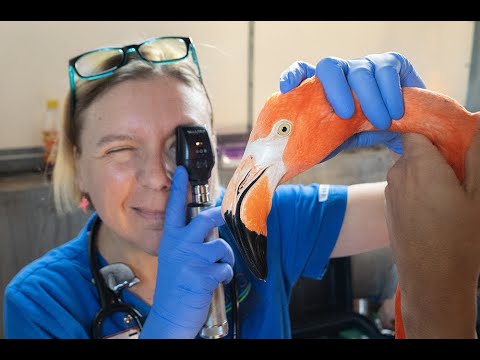On Thursday, February 15, 2024, Zoo Miami’s flock of thirty-seven Caribbean flamingos were rounded up on their habitat so that they could each receive their annual wellness exams.
The Animal Health team set up a mobile clinic alongside a specially constructed corral area adjacent to the habitat, and one by one, each flamingo was brought in to be checked by Zoo Miami Associate veterinarians Dr. Rodney Schnellbacher and Dr. Gaby Flacke with assistance from the Animal Science and Animal Health teams.
Examinations included getting individual weights, collecting blood samples, and checking the overall body condition with special attention to the feet which can be susceptible to certain issues. In addition, each flamingo was vaccinated against West Nile virus. Some also received radiographs and ultrasound examinations.
Other than some minor eye issues commonly associated with advanced age and some foot issues that will be carefully monitored, all of the flamingos appeared to be in good condition and were successfully returned to the habitat following the procedure.
These exams are part of an important preventative medicine program designed to identify any potential health issues within the zoo’s population. Because they are wild animals, they oftentimes will disguise any symptoms of disease or illness until the progression is advanced. By being able to identify any potential issues during early stages through preventative exams, lives can, and have been saved.
The Caribbean or American flamingo is one of the largest and certainly the most brightly colored of all the flamingo species. It ranges from Mexico through the Caribbean and into South America with a small population in the Galapagos Islands. They feed on alga and a variety of aquatic invertebrates. It is from the keratin in their diet that they get their salmon pink coloration. Though they are found in large flocks, they form monogamous pairs and the females only lay one egg. When the chicks hatch, they are a light gray color and will not achieve their adult coloration until after they are a year old.
Officially recognized as a native bird of Florida that had become extirpated in the 1800s due to hunting for meat and the feather trade, Caribbean flamingos have begun to reappear in various areas of the state where they seem to be spending more time. The hope is that ongoing Everglades restoration efforts may lead to flamingos once again establishing themselves in Florida as a symbol of successful conservation efforts.
Video by: Ron Magill




